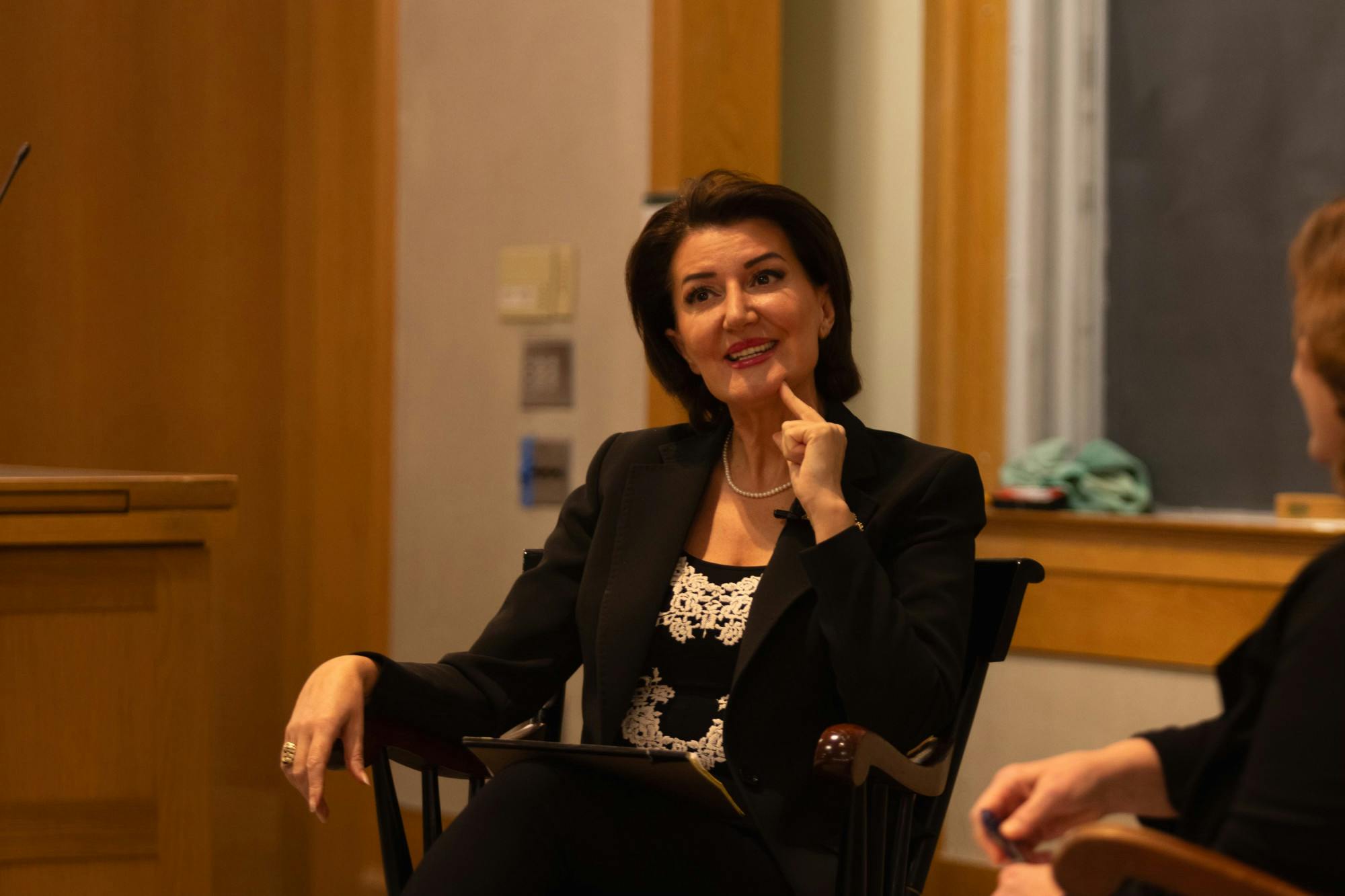On Jan. 31, the Montgomery Fellows Program hosted a conversation with former Kosovo President Atifete Jahjaga. The event was entitled “A Tale of Feminist Leadership: A Conversation with Atifete Jahjaga” and was moderated by Victoria Holt, director of the John Sloan Dickey Center for International Understanding. According to programming officer Ellen Henderson, an estimated 83 students, faculty and community members attended.
Jahjaga was the first female president of the Republic of Kosovo and is the youngest female head of state ever elected globally. Jahjaga participates in international conferences on female empowerment and sexual violence and is the founder of the Jahjaga Foundation, which focuses on youth and female empowerment in Kosovo. She has returned to Dartmouth as a Montgomery Fellow for the 2023-24 academic year after previously serving in the same capacity in the summer of 2016. She is currently teaching a course entitled “War, Nationalism, and Sexual Violence in Southeast Europe” in the women’s, gender and sexuality studies department.
Jahjaga began her remarks by discussing her path to becoming president of Kosovo. She was born in the former Republic of Yugoslavia and grew up during a period of severe civil unrest.
“I still have a memory of my mother sitting on the balcony and looking to the left and the right, where me and my brother were coming back [from school],” Jahjaga said. “And [wondering if] we were coming back alive.”
After completing her education in Kosovo, Jahjaga rose through the ranks of the Kosovo Police, eventually becoming the Deputy General Director of the Police of Kosovo. In 2010, she was nominated as a non-partisan, consensus candidate for the presidency with support from three political parties.
Jahjaga said she never imagined that she would serve as president and was initially reluctant to accept the nomination.
“Initially, I had a resistant stance,” she said. “I was very young. I had no political experience or background. I simply did not foresee myself at that moment in time to be aligned [with a party].”
Jahjaga said she accepted the nomination with certain stipulations.
“I went to the political parties and communicated that I’ll be a consensus candidate, but I have three main conditions,” Jahjaga said. “The first condition was that I am not going to be a member of a political party. The second was that I’m not going to allow interference to the Office of the President, and I will strictly obey my constitutional obligation and legal obligation. Third, I’m not going to allow any interference in selecting my cabinet of advisors. All conditions were accepted.”
She served as the third president of Kosovo, leading a country still reeling from the Kosovo conflict, which took place in the late 1990s.
Jahjaga then discussed her focus on sexual violence prevention during her time as president and described a deeply influential experience she had early on in her presidency when visiting survivors of sexual violence.
“[The women] started taking off their clothes because it was only me and them in the room. When I saw their bodies, I couldn’t imagine what they had gone through,” Jahjaga said. “Their bodies were turned into the battlefield.”
Jahjaga said sexual violence has been used as a tactic for war.
“I engaged in my term to do research about the trauma,” Jahjaga said. “In Kosovo, Bosnia, Rwanda or anywhere in the world, [sexual violence] is recognized as a tool of war because they want the consequence to last long after the war has officially been over.”
Jahjaga spent a year working on comprehensive reforms. She passed a presidential decree to protect victims of sexual violence, for which she faced intense backlash from within the government. According to Jahjaga, government leadership told her they would not support the measure and reminded her that she had “no political party.” Ultimately, however, she was successful in passing her decree.
Following the moderated questions, Jahjaga took questions from the audience. Government professor Lisa Baldez asked Jahjaga to speak to the distinctiveness of male sexual violence survivors. Jahaga responded that there is “3000% more stigma and taboo” about men.
Adriana Chavira Ochoa ’24 asked Jahjaga for advice for young women.
“To the women of this room, especially to you, your generation, do stick [together],” Jahjaga said. “Criticize in private, praise in public.”
Miranda Natera, a masters student in the Comparative Literature Program, said that she attended the event because she was unable to enroll in Jahaga’s class, “but still really wanted a chance to meet her.”
“Having her is living proof that there is hope,” Natera said. “There are things that go beyond any book that you can read.”
Ochoa said she found the event “inspiring.”
“She was able to teach us about Kosovo and how she furthered the political aims of the country, while also championing women’s rights,” Ochoa said.
The Montgomery Fellows Program is a Dartmouth initiative funded by the Kenneth and Harle Montgomery Endowment. The Program invites “outstanding luminaries” to live in the Montgomery House overlooking Occom Pond for a short period of time and interact with the Dartmouth community through teaching or speaking engagements. Previous Fellows include NSA Director Jake Sullivan, actor Alan Alda and cellist Yo-Yo Ma.

Aidan Silvestro is a '27 from Monroe, Connecticut. Interested in the intersection of climate, energy, and international security, Aidan is pursuing an Earth Science and Russian degree. Aidan is a research assistant in the Earth Sciences Department studying permafrost thaw in the Arctic and on Mars. In his free time, Aidan skis for the Dartmouth Club Alpine Ski Team, enjoys film and DSLR photography, long-distance hiking, and gardening.




